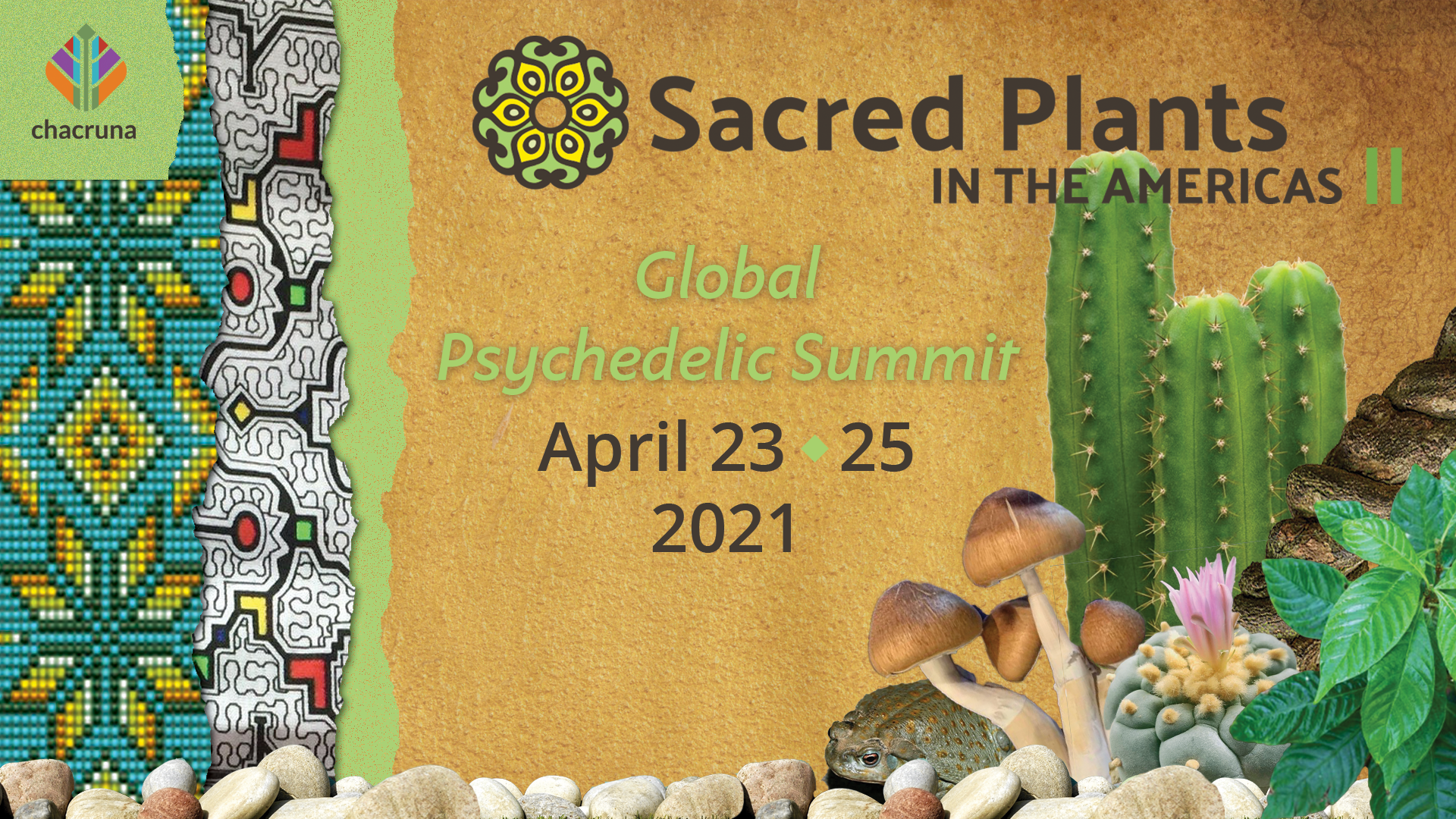- Meet Chacruna at Psychedelic Science 2025 - May 27, 2025
- Psychedelics and Attachment: Fundamentals, Implications, and New Frontiers - May 16, 2025
- Development Outreach Internship (OPEN) - May 6, 2025
Global Virtual Psychedelic Summit
April 23-25, 2021
Featuring 80+ speakers–including Indigenous leaders from throughout North, Central and South America, as well as researchers, practitioners, community builders and other experts from around the world–who will present three simultaneous tracks of talks and panel sessions to discuss the benefits and harms of the globalization of psychedelic plant medicines and the need for Indigenous reciprocity.
As psychedelic plant medicines become increasingly global, many Indigenous communities and traditions throughout the Americas continue to be marginalized and excluded from the benefits of such expansion. It is vital that members of the psychedelic community help support these Indigenous groups and the traditional and local spiritual and ecological knowledge they preserve and practice. This event is a follow-up to our conference, Plantas Sagradas en Las Américas, held in Mexico in February 2018, which featured more than 160 speakers from dozens of countries, including 23 members of indigenous communities of 11 different ethnic groups. Chacruna’s Sacred Plants in the Americas II on April 23-25, 2021 is a call to action to bring awareness to issues around the globalization, commodification, medicalization and decriminalization of psychedelics, and to offer practical information and tools to promote Indigenous reciprocity. We will explore how psychoactive plants have been used throughout history and in different geographical areas, as well as their use and active compounds in multiple contexts; including scientific research, empirical experience, cultural manifestations and the ways in which the state has administered these practices. Presentations will address the traditional and modern uses of various psychoactive plants and include a diverse range of perspectives and fields of knowledge. In doing so, this conference invites us to rethink dichotomies such as sacred vs. profane, modern vs. traditional, legal vs. illegal, and natural vs. artificial, thus bringing much-needed complexity and nuance to the mainstream conversation.
Some of our speakers and panels from the schedule include:
- Panel with Cash Ahenakew, Vanessa Andreotti, Rene Suša, Ninawa Huni Kui – Towards Plant Assisted Neuro-Decolonization and Reciprocity in Engagements with Indigenous Communities
- Esther Jean Langdon – Half a Century of Research on Shamanism
- Panel with Miguel Evanjuanoy Chindoy, Daiara Tukano, Joe Tafur, Leanna Standish, Victoria Hale, Miguel Evanjuanoy Chindoy – The Medicalization of Ayahuasca: Promises, Challenges, and Reciprocity
- Panel with David Bronner, Sutton King, Kat Conour, Troy, David Heldreth – Psychedelics, Philanthropy and Power in the Emerging Psychedelic Industry
- Panel with Adele Lafrance, Jessica Nielson, Kim Kuypers, Clancy Cavnar – Ayahuasca Healing and Science
- Daniel Carcillo – How Psychedelics Helped me Overcome Emotional, Sexual and Physical Trauma within Hockey’s Culture
- Marca Cassity, Katherine A. Costello – Beyond Oneness: A Two-Spirit Approach to Social Construction, Social Justice and Psychedelics
- Biraci Brasil (Translated by Pedro von Tol) – Sacred Medicines, Music and Indigenous Spirituality Among the Yawanawa People
- Panel with Riccardo Vitale, Miguel Evanjuanoy (Translated by Diana Negrín) – Indigenous Biocultural Defense: Reclaiming Culture, Reclaiming Fundraising
- Lucy Benally, Miriam Volat – A Grandmothers Prayer Indigenous Peyote Conservation and Keeping what is Sacred, Sacred
- Sara Reed – Mainstreaming Psychedelics? The Shadows, the Spiritual, and the Service
- Ibrahim Gabriel and Ivonne Roquet – “Therapeutic Use of Psycho-Dysleptics”: The Methodology of Dr. Salvador Roquet
- Panel with Lisbeth Bonilla, Diana Negrín, Pedro Nájera Quezada, Hermenegildo Hauritemai Rivera Eleuterio, Santos Rentería, Mario Muñoz – Wixárika Perspectives on Peyote Politics
- Kathleen L. Harrison – Almost Visible: A Multi-Generational Friendship, and a Film, Grow from Fieldwork Among the Mazatec
In addition, some of our many unique topics include:
- Indigenous Use of Plants and Mental Health
- Toad Medicine: The Science, Myths and New Culture of 5-MeO-DMT
- Women in the History of Sacred Plants
- Ayahuasca in the Laboratory
- Plant Medicines and Sports
- Fly Agaric: The Misunderstood Magic Mushroom
- Mazatec Perspectives on the Globalization of Mushrooms
- Peyote Bi-National Politics
- Healing Racial Trauma with Psychedelics
- Psychedelics, Green Colonialism and Climate Change
- The New Psychedelic Business Boom
- Psychedelics and Social Media
View the full schedule at https://chacruna.net/sacred-plants-americas-2-conference/
Indigenous Reciprocity Initiative of the Americas Launch
In parallel with this conference, Chacruna will launch its new Indigenous Reciprocity Initiative of the Americas (IRI), a comprehensive online resource allowing people to connect with and donate to grassroots Indigenous nonprofits and community initiatives at the local level. Rather than imposing Western ideas of sustainable development, the goal of this initiative is to promote community-led grassroots projects designed and implemented by local Indigenous people to address their own self-determined needs. The IRI webpage is an open resource facilitating unmediated support of 30 Indigenous-centered, community driven organizations directly from our audience. In addition to individual donations, IRI strives to foster a relationship of reciprocity within the rapidly growing industry generated by the mainstreaming of psychedelics through the IRI Program. The IRI Program will accompany the main resource as a unified pathway for support by distributing donations evenly among all 30 of the grassroots organizations showcased in the IRI webpage, acting as a mechanism for businesses, foundations, and private donors to address the disparities stemming from the globalization of psychedelic plant medicines.
Ayahuasca Healing and Science Book Launch
During the conference, Chacruna will launch the book, Ayahuasca Healing and Science, edited by Beatriz Caiuby Labate and Clancy Cavnar and published by Springer (2021). The Chacruna Institute will host a panel with some of the authors during the conference.
Gold Sponsors
Silver Sponsors
McAllister Garfield, P.C., Auryn Project, MAPS, Synthesis Retreat, Nikean Foundation, Numinus, RiverStyx Foundation
Please email us at [email protected] with inquiries regarding sponsorships.
Press Credentials
To request a press credential, email us at [email protected] with PRESS CREDENTIAL REQUEST in the subject line.
About Chacruna Institute
The Chacruna Institute for Psychedelic Plant Medicines, an organization founded by Brazilian anthropologist Dr. Bia Labate, produces high-quality research on plant medicines and psychedelics and helps propagate academic knowledge in more accessible formats. We educate the public and create cultural understanding and legitimacy regarding these substances so that they may cease to be stigmatized and outlawed. Chacruna also promotes a bridge between the world of plant medicines and the emergent field of psychedelic science, between “traditional ceremonial use” and clinical and therapeutic settings, bringing the knowledge and perspectives of the social sciences to health care professionals and practitioners of psychedelic-assisted therapy. Finally, we foster cultural and political reflections on the field of psychedelic science and facilitate conversations about controversial topics that have been simmering on the sidelines as psychedelics go mainstream.
Art by Trey Brasher.
Take a minute to browse our stock:
Did you enjoy reading this article?
Please support Chacruna's work by donating to us. We are an independent organization and we offer free education and advocacy for psychedelic plant medicines. We are a team of dedicated volunteers!
Can you help Chacruna advance cultural understanding around these substances?



















